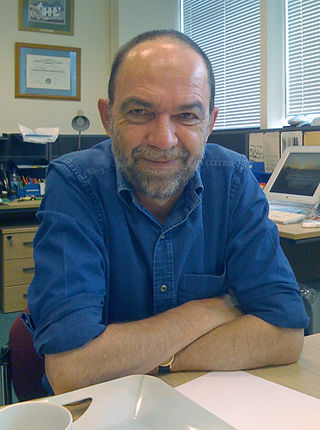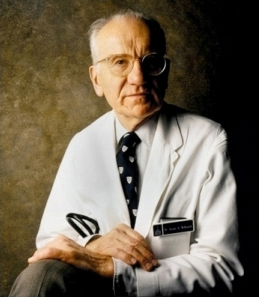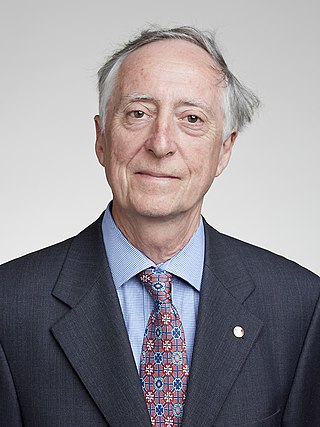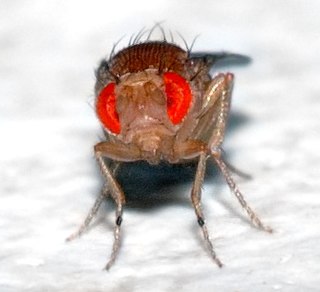
Sir Alec John Jeffreys, is a British geneticist known for developing techniques for genetic fingerprinting and DNA profiling which are now used worldwide in forensic science to assist police detective work and to resolve paternity and immigration disputes. He is Professor of Genetics at the University of Leicester, and became an honorary freeman of the City of Leicester on 26 November 1992. In 1994, he was knighted for services to genetics.

The University of Leicester is a public research university based in Leicester, England. The main campus is south of the city centre, adjacent to Victoria Park. The university's predecessor, University College, Leicester, gained university status in 1957.

Sir Cyril Astley Clarke, KBE, FRCP, FRCOG, (Hon) FRC Path, FRS was a British physician, geneticist and lepidopterist. He was honoured for his pioneering work on prevention of Rh disease of the newborn, and also for his work on the genetics of the Lepidoptera.

Victor Almon McKusick was an American internist and medical geneticist, and Professor of Medicine at the Johns Hopkins Hospital, Baltimore. He was a proponent of the mapping of the human genome due to its use for studying congenital diseases. He is well known for his studies of the Amish. He was the original author and, until his death, remained chief editor of Mendelian Inheritance in Man (MIM) and its online counterpart Online Mendelian Inheritance in Man (OMIM). He is widely known as the "father of medical genetics".

The Bartlett Faculty of the Built Environment, also known as The Bartlett, is the academic centre for the study of the built environment at University College London (UCL), United Kingdom. It is home to thirteen departments that have expertise in individual subfields, including the Bartlett School of Architecture, Bartlett School of Planning, Bartlett Development Planning Unit, and the Centre for Advanced Spatial Analysis. The Bartlett is consistently ranked the highest in Europe and the UK and among the highest in the world for the "Architecture and the Built Environment" category in major rankings. It is currently ranked the first in the world for the year 2023.

Graham Arthur Charlton Bell is a British academic, writer, and evolutionary biologist with interests in the evolution of sexual reproduction and the maintenance of variation. He developed the "tangled bank" theory of evolutionary genetics after observing the asexual and sexual behaviour patterns of aphids as well as monogonont rotifers.
Gabriel A. Dover was a British geneticist, best known for coining the term molecular drive in 1982 to describe a putative third evolutionary force operating distinctly from natural selection and genetic drift.

Jack William Szostak is a Canadian American biologist of Polish British descent, Nobel Prize laureate, university professor at the University of Chicago, former Professor of Genetics at Harvard Medical School, and Alexander Rich Distinguished Investigator at Massachusetts General Hospital, Boston. Szostak has made significant contributions to the field of genetics. His achievement helped scientists to map the location of genes in mammals and to develop techniques for manipulating genes. His research findings in this area are also instrumental to the Human Genome Project. He was awarded the 2009 Nobel Prize for Physiology or Medicine, along with Elizabeth Blackburn and Carol W. Greider, for the discovery of how chromosomes are protected by telomeres.
Nicholas Gordon Martin is an Australian behavior geneticist who has published over 1300 peer-reviewed articles on topics including the heritability of religion and intelligence and medical disorders such as endometriosis. Martin is among the most cited medical scientists in the Southern Hemisphere, with a number of citation classics including "Genes, culture and personality: An empirical approach" that he co-authored with Lindon Eaves and Hans Eysenck, "Analysis of the p16 gene (CDKN2) as a candidate for the chromosome 9p melanoma susceptibility locus" (Nature, and "Genetic and environmental contributions to alcohol dependence risk in a national twin sample".
Sir Peter Julius Lachmann was a British immunologist, specialising in the study of the complement system. He was emeritus Sheila Joan Smith Professor of Immunology at the University of Cambridge, a fellow of Christ's College, Cambridge and honorary fellow of Trinity College, Cambridge and of Imperial College. He was knighted for service to medical science in 2002.
John Andrew Todd FMedSci FRS is Professor of Precision Medicine at the University of Oxford, director of the Wellcome Center for Human Genetics and the JDRF/Wellcome Trust Diabetes and Inflammation Laboratory, in addition to Jeffrey Cheah Fellow in Medicine at Brasenose College. He works in collaboration with David Clayton and Linda Wicker to examine the molecular basis of type 1 diabetes.
William Hayes FRCPI FRS FRSE LLD was an Irish geneticist.
Martin Bobrow is a British geneticist, and Emeritus Fellow, Wolfson College, Cambridge.
Stephen Joseph Elledge is an American geneticist. He is the current Gregor Mendel Professor of Genetics and of Medicine at the Department of Genetics of Harvard Medical School and in the Division of Genetics of the Brigham and Women's Hospital. His research is focused on the genetic and molecular mechanisms of eukaryotic response to DNA damage, and is known as the discoverer of the DNA damage response (DDR).
Peter William Harold Holland is a zoologist whose research focuses on how the evolution of animal diversity can be explained through evolution of the genome. He is the current Linacre Professor of Zoology at the University of Oxford, and a Fellow of Merton College, Oxford.

Drosophila circadian rhythm is a daily 24-hour cycle of rest and activity in the fruit flies of the genus Drosophila. The biological process was discovered and is best understood in the species Drosophila melanogaster. Other than normal sleep-wake activity, D. melanogaster has two unique daily behaviours, namely regular vibration during the process of hatching from the pupa, and during mating. Locomotor activity is maximum at dawn and dusk, while eclosion is at dawn.

Michael Harvey Hastings is a British neuroscientist who works at the Medical Research Council MRC Laboratory of Molecular Biology (LMB) in Cambridge, UK. Hastings is known for his contributions to the current understanding of biological clocks in mammals and marine invertebrates.

Michael William Bruford was a Welsh molecular ecologist, conservation biologist and a professor at Cardiff University's School of Biosciences. His area of research spanned from animal wildlife genetics to the management of captive populations and livestock breeds to animal biobanking. After earning his B.Sc. from the University of Portsmouth and his PhD from the University of Leicester, Bruford worked at the Zoological Society of London where he became Head of Conservation Genetics before joining Cardiff University as reader in 1999 and professor in 2001. In addition to his research activities at Cardiff University, he was also director of the Frozen Ark project, which seeks to preserve threatened animal species by means of cryopreservation.
Michael Gordon Ritchie is a British evolutionary biologist and professor at the University of St Andrews. He is known for his work on speciation. He served as editor-in-chief of the Journal of Evolutionary Biology from 2011 to 2017, and Vice-President of the Society for the Study of Evolution from 2004 to 2005.

Grant Robert Sutherland is a retired Australian human geneticist and celebrated cytogeneticist. He was the Director, Department of Cytogenetics and Molecular Genetics, Adelaide Women's and Children's Hospital for 27 years (1975-2002), then became the Foundation Research Fellow there until 2007. He is an Emeritus Professor in the Departments of Paediatrics and Genetics at the University of Adelaide.










